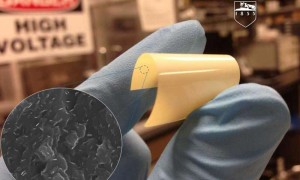
The new polymer is able to store energy at higher temperatures.
Image: Qi Li/Nature
Polymer dielectric materials have many beneficial properties when it comes to energy storage for advanced electronics and power systems. While the materials are highly flexible and have good chemical stability, their main drawback is their limitation of functionality in primarily low working temperatures. In turn, this limits the wider use of polymer dielectric materials for applications such as electric vehicles and underground oil exploration.
However, researchers from Pennsylvania State University have developed a flexible, high-temperature dielectric material from polymer nanocomposites that looks promising for the application of high-temperature electronics.
The researchers, including current ECS member Lei Chen, were able to stabilize dielectric properties by crosslinking polymer nanocomposites that contain boron nitride nanosheets. In testing, the energy density was increased by 400 percent while remaining stable at temperatures as high as 300° C.
With the nanocomposites having huge energy storage capabilities at high temperatures, a much broader application of organic materials in high temperatures electronics and energy storage can be explored.
PS: Interested in polymer research? Make sure to attend the 228th ECS Meeting and get the latest polymer science at our polymers symposia.

